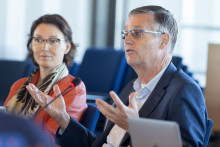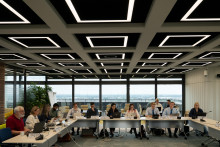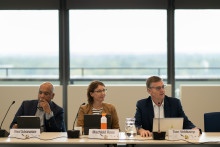'Political majority against commercial foundation years'
A recent evaluation shows that the preparatory year of Twente Pathway College does not sufficiently prepare international students for UT education. In response to the criticism, the admission requirements and content of the programme were partly tightened. However, the University Council expressed little optimism about the adjustments. Because of the low success rate for the BSA, the University Council questioned why the requirements for completing the foundation year were not increased.
In his response, rector Tom Veldkamp said he would take the advice into account in negotiations with Navitas, the commercial provider of the bridging programme in Twente. The rector also pointed to the political discussion. 'A political majority seems to be against commercial providers. It remains to be seen what regulations will follow from this. If we face a ban, we may have to offer the foundation year ourselves.'
The contract with Navitas still runs until 2024. 'If there may not be an extension of the contract, will the advice to improve the programme be adopted?,' Hanneke Becht (Campus Coalition) wanted to know. Veldkamp reassured her. 'It is high on our list. We are taking steps to better align the foundation year with UT bachelor education.'
Delayed decision on wel-being action plan
The employee well-being action plan was initially supposed to be tabled for approval. And the council planned not to agree to the plan, for a multitude of reasons. It did not come to a vote this morning. In fact, the council had too little information at its disposal, so the item was postponed to February. That is when the action plan, together with a new HR policy plan, will be on the table for decision-making.
The University Council is particularly concerned about the lack of clarity at several levels. For example, the council needs a central framework for employee well-being, to prevent different groups being given different rights at a local level. The council also wants to see more specific instruments for managers, teams and individuals and clarity for employees who are not employed by UT, such as external PhD candidates.
The Executive Board will send the University Council the requested information. This mainly involves reports from the ombuds officer, the health and safety service, complaints committees and confidential counsellors. The Executive Board also pledged to 'synchronise' these reports better with each other, in order to provide the council with complete and timely information.
Preparing for covid: 'Stay flexible as a community'
The plan to prepare for various covid scenarios was unsatisfactory for the University Council last month. The document has since met the wishes of the council, it emerged on Wednesday morning. Five different scenarios form the core of the plan. From dark green, in which covid is little more than an 'ordinary' flu, to code black: the virus turns out to be even more dangerous than imagined. The UT community should prepare for all five scenarios.
Rector Tom Veldkamp expressed his happiness with the new plan. However, he did warn that the university must remain agile and flexible. 'Things will happen that we cannot foresee. We have shown before that we are a flexible community.' A university-wide communication campaign on the plans will start soon.
Price hikes
The University Council touched on inflation and other increased costs for students and employees. Measures are already being taken for employees, vice-president Machteld Roos responded. But whether more is possible in terms of compensation, she said, depends on fiscal restrictions.
For students, it is a different story, said to the council. According to Jacqueline Weppelman, the price of a hot meal in the Waaier has gone from 5 euros to 5.50 euros and she asked the board whether agreements can be made with caterer Appèl. 'Students in particular are helped by an affordable, warm and healthy meal,' explained substitute chair Hanneke Becht. 'Not to mention the energy costs. I was shocked to hear that.' She was echoed by Jaime de Bruin (UReka). 'Especially given the increased energy costs, every little bit will help.' But according to his fellow party member Aareso Sha, it is not so much the price that is the problem. 'There has been a survey. They were found to be more bothered by the quality of the food, rather than the prices. They would be fine paying 5.50 euros for a nutritious and healthy meal.'
Protests in Iran
Student party UReka raised the issue of protests in Iran. Sha: 'Over a week ago, there was an information meeting. What we heard from Iranian staff and students was that they hoped for more support and guidance from the university. The situation in Iran has a negative effect on their well-being and academic performance.' Her fellow party member Fridtjof Otto added: 'It's about making them feel acknowledged in the first place. Then it's about active help, for example whether study advisers respond adequately to the situation.'
Rector Tom Veldkamp responded that Dutch universities will soon come up with a joint statement on the situation in Iran. 'For moral support and to express our concerns. We are still waiting for other universities, but we support that message anyway.' Vice-president Machteld Roos added that in sharing that statement, referral will also be made to the help structure within UT, for those who need it.







